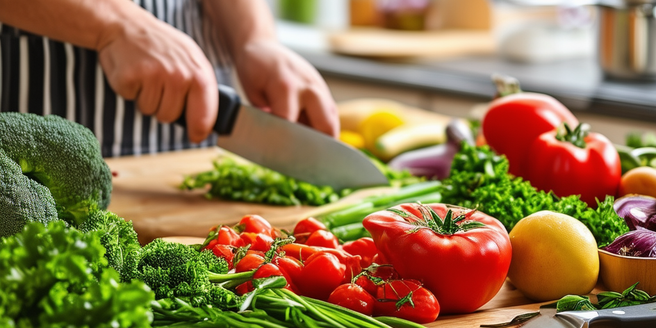
Introduction to Meal Prep Benefits
| Benefit | Description | Example |
| Time-Saving | Prepping meals in advance saves time on busy weekdays. | Chopping vegetables on Sunday for use throughout the week. |
| Cost-Effective | Buying groceries in bulk and planning meals reduces food waste and costs. | Preparing bulk meals like soups and stews. |
| Healthier Choices | Cooking at home allows you to control ingredients and portion sizes. | Making salads and balanced meals instead of fast food. |
| Less Stress | Having meals ready eliminates the stress of daily cooking. | Using pre-made lunches and dinners during the work week. |
| Variety | Meal prep encourages trying different recipes and cuisines. | Exploring international cuisines in meal prep. |
| Family Time | Meal prep can be a family activity, fostering quality time together. | Cooking with kids on weekends. |
Choosing Nutritious Ingredients
Choosing nutritious ingredients is a cornerstone of effective meal prep. Focus on incorporating whole foods such as vegetables, fruits, grains, and lean proteins. Planning ahead can help you stay on track with your dietary goals. Opt for seasonal and locally-sourced produce to ensure freshness and maximize nutritional value. Reducing processed foods and added sugars will contribute to healthier meals. Experiment with different flavors and textures to keep meals exciting and satisfying. Having a well-stocked pantry with staple ingredients like olive oil, spices, and herbs can make meal preparation simpler and more efficient. These choices not only support a balanced diet but also foster healthier eating habits for the entire family over time.
Essential Kitchen Tools
Having essential kitchen tools can significantly streamline your meal prep process. Invest in quality knives as they make chopping and slicing more efficient and safer. A food processor can save time on tasks like chopping, shredding, and blending. Consider having a slow cooker or an Instant Pot for easy, hands-off cooking, perfect for busy days. Glass storage containers are useful for keeping your prepped meals fresh and organized. Don’t forget that a good set of pots and pans can also enhance your cooking experience. Additionally, measuring cups and spoons, cutting boards, and mixing bowls are basic tools that simplify food preparation. With the right tools at your disposal, prepping meals becomes less of a chore and more of an enjoyable activity.
Planning a Weekly Menu
Planning a weekly menu is critical in successful meal prep practice. Start by evaluating your family’s schedule to determine how many meals you need for the week. It helps to involve family members in the planning process to ensure everyone’s preferences are considered. Choose recipes that can be efficiently prepared in advance and consider incorporating leftovers. Remember to account for any dietary restrictions or preferences. Balance the menu by including a mix of proteins, vegetables, grains, and healthy fats. Write a detailed grocery list based on your menu plan to ensure you purchase everything in one trip. Planning ahead saves time, reduces food waste, and minimizes the stress of deciding what to cook each day. Consistent planning leads to consistent healthy eating habits.
Time-Saving Cooking Tips
Utilizing time-saving cooking tips can make meal preparation more manageable for working parents. Batch cooking is one of the most effective strategies; prepare a large quantity of a particular dish and divide it into portions for multiple meals. Not only does this save time, but it also reduces the stress of daily meal planning. Utilize one-pot or sheet-pan recipes to cut down on cooking and cleaning time. Pre-chop vegetables and measure out ingredients ahead of time, so they’re ready when you need them. Additionally, making good use of a slow cooker or pressure cooker can ensure meals are ready with minimal effort. Incorporating these tips into your routine allows you to spend less time in the kitchen and more time with your family.
Healthy Breakfast Ideas
Starting the day with a healthy breakfast is crucial, especially for busy families. Consider meal prepping overnight oats or chia pudding, which are easy to prepare and customize with fruits and nuts. You might also try making a large batch of granola that can be quickly paired with yogurt or milk. Smoothie packs with pre-portioned fruits and vegetables can be stored in the freezer and blended quickly in the morning. For those who prefer savory options, egg muffins or breakfast burritos are great make-ahead options that can be reheated. Whole grain toast with avocado or nut butter offers a quick, nutritious choice. With these breakfast ideas prepped in advance, mornings become smoother and ensure everyone starts their day with a nutritious meal.
Quick Lunch Recipes
Quick lunch recipes are essential for busy parents who need fast and nutritious midday meals. Grain bowls with quinoa or brown rice topped with a variety of vegetables and lean proteins are easy to assemble. Wraps and sandwiches with whole grain bread or tortillas filled with veggies, hummus, or lean meats can be prepped in advance. You can even get your kids involved in the preparation to make it a fun family activity. Salads in a jar are a great option; layer ingredients to keep vegetables fresh, and add the dressing just before eating. Leftovers from dinner can also make a convenient lunch. These quick options help ensure you’re eating well even when time is limited.
Dinner Options for Busy Evenings
Dinner options for busy evenings should be simple, nutritious, and satisfying. Consider one-pot meals such as stews, casseroles, or stir-fries, which require minimal cleanup. Sheet pan meals, where proteins and vegetables are cooked together, save time and effort. Preparing marinades and chopping ingredients in advance makes for quick assembly when it comes to cooking. Pre-made frozen meals or components like cooked grains and proteins can be a lifesaver. Also, batch cooking on weekends can provide quick and healthy options during the week. Additionally, slow cooker recipes can be prepped in the morning and ready by dinnertime. Incorporating these dinner ideas into your meal planning can help maintain a balanced diet without a lot of evening stress.
Snack Prep and Storage Solutions
Snack prep and storage solutions are essential for maintaining healthy eating habits throughout the day. Pre-wash and portion out fruits and vegetables into snack-sized containers for easy access. Homemade trail mix, yogurt with granola, and hummus with veggie sticks are healthy and convenient choices. Having a variety of snacks on hand can prevent unhealthy last-minute decisions. Opt for reusable storage bags or containers to keep snacks fresh and reduce waste. Label and date your snacks to keep track of their freshness. Storing them in a designated snack area in your fridge or pantry makes them easily accessible for both kids and adults. With snacks ready to go, making healthy choices becomes effortless.
Maintaining a Meal Prep Routine
Maintaining a meal prep routine simplifies your weekly schedule and supports a healthier diet. Dedicate a specific day or time each week for grocery shopping and meal preparation. Involve the whole family to share the workload and make it more enjoyable. Evaluate what worked and what didn’t at the end of each week to make improvements for the next. Consider setting aside some time to experiment with new recipes and ingredients. Keep a collection of favorite recipes and rotate them to keep meals exciting. Consistency is key, so try to stick to your meal prep schedule as much as possible. Over time, this routine will become second nature and a valuable tool for managing a busy lifestyle.

